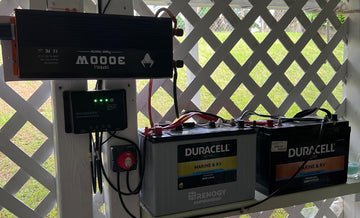As solar panels become more popular and more people choose to install solar power systems to power their homes.
Many people who are considering installing solar panels have questions about their potential health risks. Some people even report feeling uncomfortable or uneasy around them due to electromagnetic radiation, in fact, solar panels do not cause any major health risk issues, so please don't worry!
Components of a solar panel
Solar panels consist mainly of photovoltaic cells (usually silicon-based materials) that convert sunlight into electricity. Some chemicals may be used in the manufacturing process of photovoltaic cells, which has raised concerns about their health risks. In addition, the surface of solar panels is usually covered with a layer of glass to protect the internal components.
Potential Health Risks
Risks in the manufacturing process: The manufacturing process of solar panels may involve some hazardous chemicals such as cadmium, lead and other heavy metals. These substances may pose some risks to workers and the surrounding environment during the manufacturing process. However, modern manufacturing processes are gradually being improved to minimise the use of these hazardous substances and increase worker safety and security.
Noise pollution: Solar panels produce little noise during normal operation and therefore have little impact on humans. However, during installation and maintenance, mechanical noise may be involved, and this noise may have some impact on the surrounding residents.
Electromagnetic radiation from solar panels
Solar panels do generate a certain amount of electromagnetic radiation during normal operation, but its intensity is much lower than the level of radiation generated by other electrical devices (e.g. mobile phones, microwave ovens, etc.) that we often come into contact with in our daily lives. According to most studies, electromagnetic radiation from solar panels is considered safe and has no significant negative impact on human health.
A major source of electromagnetic radiation is the flow of electric current through solar panels, which is primarily non-ionising radiation and does not normally cause harm to biological tissues. The World Health Organisation (WHO), as well as other relevant research institutes, have indicated that there is currently no evidence that electromagnetic radiation from solar panels poses a health risk.
Do solar panels cause the heat island effect?
The heat island effect is the phenomenon of increased temperatures in urban areas due to human activity, usually due to the absorption and storage of heat on impervious surfaces such as buildings, roads and vehicles. However, the impact of solar panels on the heat island effect is more complex.
- Heat Absorption: Solar panels absorb sunlight and convert it into electricity during the power generation process, a process that does result in an increase in panel surface temperature, but the heat release is relatively small compared to the surrounding environment.
- Reflection effect: Some solar panels have a high reflectivity and can reflect some of the incident solar radiation back into the atmosphere. This reflective effect helps to reduce the temperature of the surrounding environment to a certain extent, and may instead have a positive effect on mitigating the heat island effect.
- Impact of Widespread Installation: When solar panels are widely installed in urban and rural areas, the overall ambient temperature may drop due to reduced dependence on fossil fuels. Thus, in the long term, widespread solar panels can help mitigate the heat island effect and rising urban temperatures.
Is installing solar panels on your house bad for your health?
Installing solar panels is usually not a threat to your health. Whilst solar panels produce a small amount of electromagnetic radiation when in operation, the intensity is much lower than the levels of radiation from everyday electrical appliances, and there is currently no evidence of significant health effects. In addition, solar panels are manufactured and installed according to a number of safety standards to minimise potential risks, and their use can indirectly have a positive impact on your health by reducing your dependence on fossil fuels and improving the quality of the environment.
FAQ
1. Do solar panels emit harmful radiation?
Solar panels do emit a trace amount of electromagnetic radiation when they are in operation, but the intensity is much lower than the level of radiation emitted by common electrical appliances in daily life (e.g. mobile phones, microwave ovens). According to available studies, radiation from solar panels is considered safe and has no significant health effects.
2. How to dispose of old solar panels?
Old solar panels should be properly recycled to avoid harming the environment. Many manufacturers and recycling centres offer specialised recycling services to ensure that hazardous substances (such as lead and cadmium) within the panels are disposed of properly. You can contact your local environmental organisation or solar supplier for details.
3. Is it safe to walk around solar panels?
It is generally safe to walk around solar panels, provided that the panels are installed properly and are not physically damaged in any way. Ensuring that the installation of the panels is done by a professional and that their condition is regularly checked can further reduce potential risks.
4. Is it safe to sit on solar panels?
Sitting on solar panels is not recommended. This can cause physical damage to the panel, while the risk also involves falls or other safety hazards. Solar panels are not designed to carry a person's weight, so it is not safe to walk or sit on them.
5. Can solar panels leak toxic chemicals?
Solar panels do not leak toxic chemicals under normal use. While some hazardous materials may be used in the manufacturing process, most solar panels are rigorously tested and certified for safety to ensure that they are not a health hazard during their working life cycle. Proper recycling practices can help prevent harmful substances in old panels from impacting the environment.

















